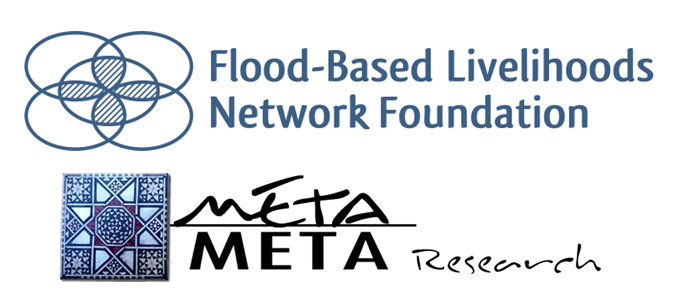

This research for development explores how to optimize the use of floods for agriculture and ecosystem services to support livelihoods in different landscapes and socio-economic settings in Sudan and Ethiopia.
The aim of this project is to add value to ongoing decision making concerning flood based farming systems development in Ethiopia and Sudan by including an ecosystems and landscape perspective to current or planned interventions and policies. It will assess and value synergies and trade-offs between the different functions and benefits of flood based farming systems under various development scenarios, for different stakeholders and the environment. It also will evaluate the productive functions and ecosystems services provided by flood based farming systems in the current situation and changes thereof as a result of the interventions proposed by farmers, governments and donors. Different stakeholder groups (men, women, youth, pastoralists, farmers, upstream/downstream) may benefit or lose under the different development options. Access to land and water resources is an important boundary condition.
The project will be implemented in three parts: 1) assessment of the baseline situation, separate for men, women and youth; 2) Impact assessment of proposed interventions; and 3) formulation and evaluation of alternative scenarios exploring trade-offs and synergies between benefits, costs and their distribution over stakeholder groups and the environment. Research activities are action oriented and will be implemented together with local stakeholders and relevant staff involved in these ongoing interventions, to enable joint learning.
It will be implemented by a consortium consisting of Spate Irrigation Network Foundation (SpNF), Mekelle University (Ethiopia), UNESCO-IHE (Netherlands) and Hydraulic Research Center (Sudan). It will closely work with the Bureaus of Water and Agriculture and local communities.
Presentations prject launch in Ethiopia:
- Harnessing Floods to Enhance Livelihoods and Ecosystem Services by Prof. Charlotte de Fraiture (UNESCO-IHE)
- WLE: The Nile Basin and East Africa Focal Region by Dr. Simon Langan (IWMI)
- Flood-based Farming Systems: From Subsistence to Significant Contributors for Food Security and Enhanced Ecosystem Services. The Journey we have travelled and the road ahead by Dr. Abraham Mehari Haile (UNESCO-IHE)
- Project: Background, objectives and deliverables by Eyasu Yazew Hagos
- Workplan 2015 – 2016 by Abraham Mehari Haile
- Flood-based farming in Tigray: Status, Potential and investment perspective by Abraha Adugna (Bureau of Water resources)
- Towards a Basin Approach for Sustainable Development of Climate Resilient Flood-Based Farming Systems by Martha G. Zenebe
Presentations project launch in Sudan:
- Report of the inception workshop by Amira Mekawi
- Defining the research program by Dr. Abraham Mehari Haile (Unesco-IHE)
- 19 important themes for the Harnessing Floods project (Arabic) by Yasir Mohammed
- Communication strategies
- GAS on the light of Ecosystem Services by Hassan Mohammed Ahmed (University of Kassala)
- Spate Irrigation in Sudan: Opportunity for Development by Abu Obieda B. Ahmed
- Gender issues in GASH (Arabic) by Ms. Khadija
- Groundwater Modeling by Mohi eldin El Kabeer
- Intro Research by Eng. Amira Mekawi
- Flood-based Farming Systems: From Subsistence to Significant Contributors for Food Security and Enhanced Ecosystems Services. The journey we travelled and the road ahead
- Gash River and Gash delta Water Resources Management Modeling by Eng. AbdelNassir Khidr M. and Yasir A. Mohamed
- Efficient distribution and use of soil moisture and ecosystem services
- Harnessing floods to enhance livelihoods and ecosystems services in Gash Area
- The GASH WUAs organizational structure, achievements, challenges, future plans (Arabic) by Mr. Mahmood (Apex WUA)
Other documents:
- The Spate Irrigation Network and Its Partners; Past Challenges and Achievements, and the Journey Ahead. Presentation of Abraham Mehari Haile. See also webinar #19: Rainfed Agriculture and Flood Based Farming
- Flood-based Farming and the Second Five Years Growth and Transformation Plan of Tigray, Ethiopia Presentation of Eyasu Yazew. See also webinar #19: Rainfed Agriculture and Flood Based Farming
- Report of official launch of the project in Ethiopia.
- Research guidelines
- Progress report Sudan 2015
- Progress report Ethiopia 2015
Final documents:
- Groundwater Management in Gash River Basin
- Gash River and Gash Delta Water Resources Management
- Ecosystem Services and Benefits
- Summary of the Main Project Findings and Recommendations (presented in closing workshop). Document prepared by Prof. Yasir, Director General of HRC on request of Minister of Water Resources, Irrigation and Electricity.
- Gender and Equity
